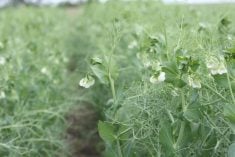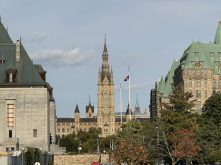Canada is not the only country wrestling with the green movement and what it means for the agriculture industry’s future
Dealing with the intersection of sustainability and policy has become a worldwide reality for those in the agri-food sector.
When panelists took the microphone Oct. 2 at the Canadian Agri-Food in a Sustainable World conference, put on by the Canadian Agri-Food Policy Institute, there were guests from Australia, the United States, European Union and Latin America. All had stories to share on sustainability goals and policy in their home nations.
Katie McRobert, executive director of the Australian Farm Institute, noted that sustainability initiatives can sometimes cause barriers in an export-driven market. In 2022, Australia was the world’s largest exporter of wheat at 28.8 million tonnes. It also ranks in the top 10 in the export of beef and dairy.
Read Also

Canola oil transloading facility opens
DP World just opened its new canola oil transload facility at the Port of Vancouver. It can ship one million tonnes of the commodity per year.
“Australian agriculture is very export focused and we export more than 70 per cent of the value of what we produce in Australia,” she said.
The scale of production is a cornerstone of food security, both in Australia and in the import markets dependant on Australian goods, she added, arguing that should be considered when drafting changes or legislation.
“It’s important to us to make sure that when we’re talking about sustainability measures, they are ones that are enabling of the trade environment, that are accepting of the way that we produce food differently.”
That will sound familiar to Canadians. Like Australia, Canada’s agricultural sector owes most of its business to international customers. According to Agriculture Canada, agriculture and food exports were worth just shy of $99.1 billion in 2023.
Earlier this year, the Canadian Agri-Food Trade Alliance said the global proliferation of sustainability policies requires “guardrails” to ensure that well-intentioned goals don’t become trade barriers.
McRobert said the tension between export considerations and sustainability goals has made it difficult to create ag legislation.
“In Australia, nobody wants to regulate agriculture but we’re getting to a point where perhaps these more uncomfortable discussions need to happen.”
Shari Rogge-Fidler is president and chief executive officer of Farm Foundation, a non-partisan organization focused on improving economic conditions for U.S. farmers. She spoke about the role external politics can play in sustainability efforts.
“When I think of collision course, I think of the politics of both trade and sustainability in the U.S., particularly right now, with the election going on,” she said. “So, as I look ahead, I think that is a key challenge. Maybe just a few months from now, we’ll have a better view on how significant those headwinds are.”
Rogge-Fidler identified two factors that are key to innovation: soil health and precision ag technology. She also said consumer-facing sectors will likely lead the way on sustainability efforts.
“How do these innovations lead to global benchmarks? Often, they don’t. It’s not as linked to the consumer-facing market. When it comes to animal ag, like dairy, that link is much clearer for consumers, and there we are seeing more significant change.”
Mark Titterington, co-founder and director of the Forum for the Future of Agriculture, said many academics and private sector players are finding sustainability solutions, and governments should be paying closer attention.
“My feeling on this, whether it’s in the EU or anywhere else, the government’s thing to focus on is enablement,” he said.
U.S. Soybean Export Council regional director Carlos Salinas spoke about expanding growing operations. Those efforts can run into challenges if major environmental impacts can result.
He said there have been discussions about reforestation in North America, and for agricultural purposes, deforestation remains a sensitive topic in other parts of the world.
“I think that for the farmers around the world, we’re not in an even keel. I think the outcomes and the outputs are different, and we can see the results,” he said.
Several panelists urged listeners to remain practical and realistic in setting sustainable agricultural goals. Salinas said many countries in Latin America will create goals with good intentions, but little regard for the impact on farmers.
In a similar vein, Rogge-Fidler said it will be vital to engage producers directly to define sustainable measurements.


















